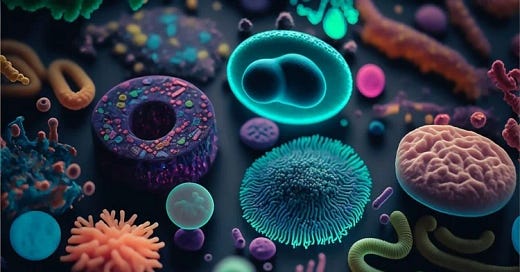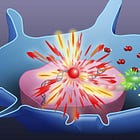For quite a while I have been waiting for evidence of this effect, until recently the evidence to this effect has been either weak, short-term, or incredibly biased. And we needed a longer-term analysis if this question would begin to be answered.
That the virus affects the microbiome has been known for quite a while, even Omicron causes a significant decrease in one of the most important microbes in the gut, one responsible for proper insulin control, which can protect against neurodegenerative diseases, it is one of the microbes responsible for modulating and creating proper immune responses towards influenza. But what exactly are the effects of SARS-CoV-2 vaccines on the microbiome ? This is what this new paper started to answer.
Baseline gut microbiota and metabolome predict durable immunogenicity to SARS-CoV-2 vaccines
The role of gut microbiota in modulating the durability of COVID-19 vaccine immunity is yet to be characterised. In this cohort study, we collected blood and stool samples of 121 BNT162b2 and 40 CoronaVac vaccinees at baseline, 1 month, and 6 months post vaccination (p.v.). Neutralisation antibody, plasma cytokine and chemokines were measured and associated with the gut microbiota and metabolome composition. A significantly higher level of neutralising antibody (at 6 months p.v.) was found in BNT162b2 vaccinees who had higher relative abundances of Bifidobacterium adolescentis, Bifidobacterium bifidum, and Roseburia faecis as well as higher concentrations of nicotinic acid (Vitamin B) and γ-Aminobutyric acid (P < 0.05) at baseline. CoronaVac vaccinees with high neutralising antibodies at 6 months p.v. had an increased relative abundance of Phocaeicola dorei, a lower relative abundance of Faecalibacterium prausnitzii, and a higher concentration of L-tryptophan (P < 0.05) at baseline. A higher antibody level at 6 months p.v. was also associated with a higher relative abundance of Dorea formicigenerans at 1 month p.v. among CoronaVac vaccinees (Rho = 0.62, p = 0.001, FDR = 0.123). Of the species altered following vaccination, 79.4% and 42.0% in the CoronaVac and BNT162b2 groups, respectively, recovered at 6 months. Specific to CoronaVac vaccinees, both bacteriome and virome diversity depleted following vaccination and did not recover to baseline at 6 months p.v. (FDR < 0.1). In conclusion, this study identified potential microbiota-based adjuvants that may extend the durability of immune responses to SARS-CoV-2 vaccines.
Every aspect of the gut affects your immunity and immune responses, both from natural infection and vaccination and given the role of the microbiome in digesting and producing many of the metabolites we need for proper health. People who respond better to vaccination (and the infection) have higher numbers of certain microbes than others, and the level of antibodies is also affected by it.
A paper previously published by the same authors demonstrated a similar trend with two specific microbes, “relative abundances of Bacteroides caccae (for both CoronaVac and BNT162b2) and Alistipes shahii (for BNT162b2 only) increased significantly.” The microbiome even regulates if, and how your body responds to endotoxemia, and as one would expect, the potential harmful or beneficial effects of these microbes are dependent on diet. Bacteroides caccae may cause bloodstream infection in rare cases and most likely comes from a compromised gut barrier (leaky gut), not a problem usually…if we were not talking about SARS2.
Of the many intriguing findings in this paper, a few caught my eye right in the first reading, such as the influence of the Influenza vaccine in long-term response to SARS-CoV-2 vaccine. The influenza vaccine positively affected the immunity provided by CoronaVac (the chinese vaccine) but had a negative effect on the BNT162b2 (Pzier’s mRNA vaccine). Intriguing because at the height of attempting to fix its mRNA vaccine, and clearly by data mining social media, one of Pfizer’s strategies was the “double whammy”, mRNA+influenza jab in a short period, since the Flu vaccine has somewhat the opposite immune response as the mRNA.
Among the BNT162b2 group, we identified 28 differential metabolites between participants with high vs. low sVNT levels 6 months p.v., including nicotinic acid (Vitamin B), γ-Aminobutyric acid (GABA), fumaric acid, 2-Aminoisobutyric acid, m-Coumaric acid (an antioxidant), and threonic acid (a metabolite of vitamin C), that were enriched in high responders; butyrate, isobutyrate, isovalerate, and benzenebutanoic acid were elevated in low responders
People with a higher capacity to neutralize the virus at 6 months had higher levels of Vitamin B3, Gaba, and 2 antioxidants. Famuric acid is derived from dimethyl fumarate, and per the citations of the paper itself has anti-inflammatory and neuroprotective properties via Nrf2 (nuclear factor-erythroid 2 related factor 2), one of the “regulators” of systemic antioxidant response. It falls in line with findings from months ago.
Where SARS-CoV-2 mRNA vaccines were found to produce such high amounts of ROS, that it usually took the body 30 days to recover to baseline. Thus having higher levels of a specific substance that influences a master regulator of antioxidation would mean better responses. In the words of the authors themselves “Apart from cross-reactivity, SARS-CoV-2 vaccines could induce systemic inflammation and increase oxidative stress, which can also induce alterations in microbiota.32”
All interesting information from a bird’s eye perspective, but what really interested me was the 6-month long change.

Many of the changes are long-lasting and the microbiome is easily one of the most complex aspects of human health and contributing factors to almost every facet of biology and medicine, indeed we are what we eat, and everything begins in the gut. A few examples are one of the microbes that are persistently low Streptococcus salivarius, which has important anti-inflammatory roles and plays an important role in inhibiting inflammation in the colon.
Another genus (fancy word for group) plays an important antimicrobial role, such as Blautia Obeum, also lower at 6 months. Via very complex metabolic processes, Anaerobutyricum hallii potentially plays a role in protecting the colon from cancer by depleting food carcinogens, this one was also less abundant even after 6 months. Flavonifractor plautii, a bacteria that increases with green tea consumption, directly suppresses IL-17 and here we see a persistent small decrease even after 6 months.
There is a persistent, lasting shift between Gram-positive and Gram-negative bacteria after each vaccine, both types, but per the graph above, and as expected the mRNA vaccine has a deeper impact on many microbes across the microbiome. A shift in the balance between Gram+ and Gram- leads to more inflammation, and higher exposure towards endotoxins (LPS).
In our study, this reduction in Gram+/Gram− ratio was also coupled with a persistent depletion in SCFA-producing Bacillota members, such as Blautia spp. and Dorea spp.
As important, this skew in the ratio of bacterias also affects Short Chain Fatty Acids (SCFAs) producing bacteria, and we now understand how important these fatty acids are, they are an energy source, they are essential for gut health, they provide butyrate to the cells in the colon, thus helping keep the integrity of the gut barrier, these fatty acids directly promote the production of T Reg cells, cells used to regulate the immune system, they play an important role in metabolism regulation, they have an anti-inflammatory role, they positively influence brain health and absorption of nutrients.
A persistent, lasting shift will clearly affect all levels of health, not a problem short-term, but obviously a considerable variable in the long-term.
Besides a clear inflammatory shift at every level, from cellular to molecular to macrobiotic, why this is significant ? Simply put, arguably the two most important aspects of human health, long-term are your gut health/microbiome and the expression of specific HERVs.
One may use the other for both health and disease per the great paper “Endogenous retroviruses promote homeostatic and inflammatory responses to the microbiota”, thus adding latent viruses to this conspicuous mess and we have what is likely the secondary hit. The first is the act of vaccinating and the body producing the Spike, a protein so foreign the body literally “burns out” its cells deliberately creating systemic inflammation and ROS.
Contributing to inflammaging and vaccination clearly plays a role here(the theme of the next one). And they also play a central role in protein misfolding (coming after the inflammaging one). Many questions are left in the air, and a lot of complex relationships are still to be uncovered and answered, but I suspect we are on the speed track of these findings.
No science to cite here, another one of my “crazy ideas/talk”, but I suspect besides other mechanisms, the deep seeded effect of the Covid infection, even Omicron, allied with the mass vaccination initially caused significant changes in the microbiome to the effect it increase the changes and susceptibility to each type of infection. Not just via one mechanism, one pathway, multiple. It is very dependent on the initial hit, and the secondary infection, this simplistic equation can often dictate how the cascade of persistent infections plays out.
After all, Endotoxin Tolerance is the tolerance towards just ONE receptor…
Your support is greatly appreciated !








Nice one.
Everything we do affects the microbiome and then the microbiome affects us.
Sabine Hazan has been discussing COVID and vax in the biome for quite a while. But we shouldn’t just blame the vax. Antibiotics, stress, hormones, heavy metals, pollution, glyphosate, xenoestrogens, all have an effect on our microbiome and are probably also a factor in our overall gut and immune health.
But the other factors were all our choice. The vax was not necessarily our choice.
I’m worried that many people are taking ivermectin which can’t have a good effect on the gut bacteria.
https://www.researchgate.net/publication/346638961_COVID-19_Pandemic_and_Dysbiosis_Can_the_Ivermectin_Hysteria_Lead_to_an_Increase_of_Autoimmune_Neuroinflammatory_Diseases